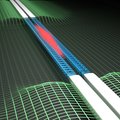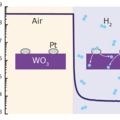Archive
30 July 2018
ERC Starting Grants for two AS researchers

The European Research Council has awarded ERC Starting Grants to two researchers of the Faculty of Applied Sciences. The grants (1,5 million euros for a five-year programme) are intended to support scientists who are in the early stages of their career and have already produced excellent supervised work.
24 July 2018
Veni for Jeremy Brown and Zoltán Perkó
NWO has announced the Veni recipients for 2018. Among them are seven Delft scientists, two of whom are from RST: Jeremy Brown and Zoltán Perkó. The Veni grants allow researchers who have recently obtained their PhD to conduct independent research and develop their ideas for a period of three years.
20 July 2018
Uncovering the interplay between two famous quantum effects

The Casimir force and superconductivity are two well-known quantum effects. Separately, these phenomena have been thoroughly studied.
18 July 2018
Veni for four researchers of AS
NWO has announced the Veni recipients for 2018. Amongst them are four researchers from the faculty of Applied Sciences: Jeremy Brown (RST), Zoltán Perkó (RST), Georgy Filonenko (ChemE) and Carlas Smith (ImPhys). The Veni grants allow researchers who have recently obtained their PhD to conduct independent research and develop their ideas for a period of three years.
12 July 2018
KWF proton research project for Holland PTC

Zoltán Perkó (Radiation, Science & Technology), together with Mischa Hoogeman (project leader, Erasmus MC) and Martijn Eenink (Holland Protonen Therapie Centrum) have been granted a KWF research project named PEARL (PrEcision of proton therapy increased by Advanced Robustness analysis).
11 July 2018
Gary Steele and Leo DiCarlo appointed as AvL-professors
06 July 2018
A hydrogen sensor that works at room temperature

Researchers at TU Delft have developed a highly sensitive and versatile hydrogen sensor that works at room temperature. The sensor is made of a thin layer of a material called tungsten trioxide.
02 July 2018
Cees Dekker surprised with Best Professor Award 2018

On Monday 2 July, Cees Dekker, Professor of Molecular Biophysics at the Faculty of Applied Sciences (AS), was surprised...
02 July 2018
Subsidy for making the ‘smartest part of the North Sea’

An advanced test area of 10 x 10 nautical miles (= about 185 football pitches) is planned for off the coast of The Hague, just outside the port of Scheveningen. This area is unique in the world. It is within this ‘smartest stretch of the North Sea’ that the likes of Delft Data Science (DDS) researchers Anna Vilanova and Elmar Eisemann will get the chance to further their research.
27 June 2018
QuTech’s Menno Veldhorst named to MIT Technology Review’s 2018 Innovators Under 35 List
Menno Veldhorst has been named to MIT Technology Review’s prestigious annual list of Innovators Under 35. Menno Veldhorst has invented a faster path to real-world quantum circuits by making it possible for them to be printed on silicon—the way computer chips have been printed for decades. Prior to Veldhorst’s innovation, it was considered impossible to make usable, semiconductor-based quantum circuits on silicon that would be stable enough to perform useful calculations.